Opening articles
A13 Stohl: Reti Opening
1.Nf3 e6 2.c4 d5 3.b3 Be7
|

|
|
Black
counters the frequently played white setup
by putting the black-squared bishops on the
same diagonal and thus depriving his
opponent of one of his biggest trumps. The
only ambitious lines then are those with the
exchange of bishops.
|
Marin: Keres Defence A40
1.d4 e6 2.c4 Bb4+ 3.Bd2 a5 4.Nf3 d6 5.g3 Nc6 6.Bg2
e5
|
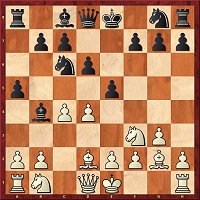
|
|
By holding back with the development of the
king’s knight Black is pursuing two aims. On
one hand, the extra tempo plays its part in
the struggle for the centre, and on the
other it is very possible to develop the
knight to h6. |
Marin: Caro-Kann
B15
1.e4 c6 2.d4 d5 3.Nc3 g6 4.Nf3 Bg7 5.h3 Nh6
|
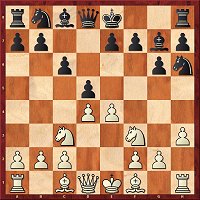
|
|
In the first part of a series on a hybrid of
the Caro-Kann and Pirc Defences, Mihail
Marin examines variations in which White
does without e4-e5 or e4xd5. Black then
often develops with …f6, …Nf7 and aims for
the advance e7-e5. |
Grivas: Sicilian B33
1.e4 c5 2.Nf3 Nc6 3.d4 cxd4 4.Nxd4 Qb6
|
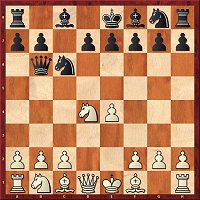
|
|
The lines in which White does without the
natural 5.Nb3 are brought together by
Efstratios Grivas under the name of the
Medusa Variation. 5.Nb5 is of some
importance, but after 5…Nf6 or 5…a6 Black
has few problems and frequently seizes the
initiative. |
Postny: Sicilian B46
1.e4 c5 2.Nf3 e6 3.d4 exd4 4.Nxd4 a6 5.Nc3 Nc6 6.Be3
Nf6 7.f4 Bb4 8.Bd3
|
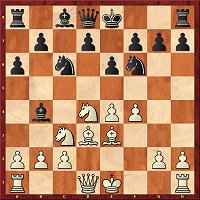
|
|
By holding back with …Qc7 Black prevents the
popular setup with Qd2 and 0-0-0 (the Nf6
would be more useful in that case than the
queen on c7). White then has another
aggressive setup, the relatively rarely seen
7.f4. |
Moskalenko: French C02
1.e4 e6 2.d4 d5 3.e5 c5 4.Qg4
|
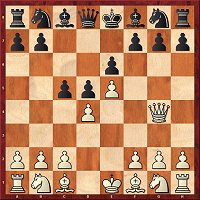
|
|
Every French player has perhaps already come
up against this aggressive queen move, above
all in blitz- or rapid chess. In these cases
it is not easy to find the correct reply
over the board. Viktor Moskalenko presents a
variation which can be described as a
refutation. |
Kuzmin: Four Knights Game C49
1.e4 e5 2.Nf3 Nc6 3.Nc3 Nf6 4.Bb5 Bb4 5.0-0 0-0 6.d3
d6 7.Bg5 Ne7
|
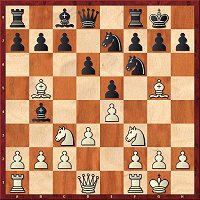
|
|
How can Black play for a win against the
Four Knights Game? Alexey Kuzmin presents a
setup which, of course, does not promise any
opening advantage; but the resulting
positions get away from the symmetrical
character of things. |
Kritz: Ruy Lopez C92
1.e4 e5 2.Nf3 Nc6 3.Bb5 a6 4.Ba4 Nf6 5.0-0 Be7 6.Re1
b5 7.Bb3 d6 8.c3 0-0 9.h3 Bb7 10.d4 Re8 11.Nbd2 Bf8
12.a3
|
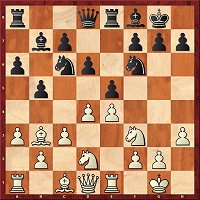
|
|
After Igor Stohl in CBM 138 (with 12.a4)
Leonid Kritz now tries to prove an advantage
after the move 12.a3. White has several
ideas: preventing …Nb4, the bishop can
establish control over the diagonal if
required by Ba2 and of course b2-b4 possibly
followed by Nd2-b3-a5. |
Schandorff: Semi-Slav D43
1.d4 d5 2.c4 c6 3.Nf3 Nf6 4.Nc3 e6 5.Bg5 h6 6.Bxf6
Qxf6 7.e3 Nd7 8.Bd3 dxc4 9.Bxc4 g6 10.0-0 Bg7
|
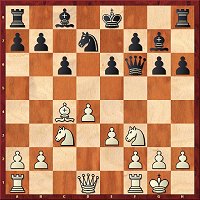
|
|
In the chess Olympiad Wang Hao managed to
defeat Alex Fier with the move 11.Re1. Lars
Schandorff explains the idea behind the rook
move – after 11…0-0 12.e4 e5 13.d5 Nb6
14.Bb3 Bg4 White can avoid the doubled pawns
on the f-file with 15.Re3. |
Krasenkow: Gruenfeld Defence D97
1.d4 Nf6 2.c4 g6 3.Nc3 d5 4.Nf3 Bg7 5.Qb3 dxc4
6.Qxc4 0-0 7.e4 a6
|
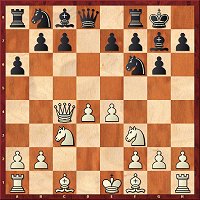
|
|
On move 7 Black has an unbelievable choice
between six respectable moves, but 7…a6 has
been played the most and has the best
statistics. Michal Krasenkow presents you
with a repertoire from Black’s point of
view. |
Schipkov: King's Indian E81
1.d4 Nf6 2.c4 g6 3.Nc3 Bg7 4.e4 d6 5.f3 0-0 6.Be3 c5
7.dxc5 dxc5 8.Qxd8 Rxd8 9.Bxc5 Nc6 10.Nge2
|
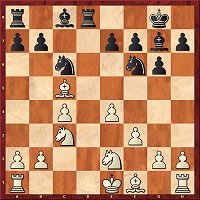
|
|
After Boris Schipkov showed in the previous
issue how White can decline the pawn
sacrifice 6…c5, he now examines the best way
to accept it. In the variation with 10.Nge2
Black must play very accurately in order to
keep things in balance. |